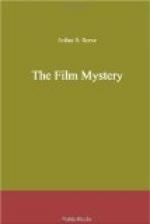Her answer, in the faintest of whispers, staggered me.
“If you have the blood of another man on your hands I’m through.”
XXII
THE STEM
Though my hands trembled so that I could hardly control them, I managed to close the door softly and to back away down the hall without being discovered. My head was spinning and I was dizzy. With my own ears I had heard Marilyn Loring virtually betray the guilt of the man she loved and whom therefore she had tried to shield. “If you have the blood of another man on your hands—” What more could Kennedy want?
I started to run toward the studio. Then recollection of my errand stopped me. Kennedy wished the blood smears and stomach contents and was anxious to get them before the arrival of the police. At first I thought that all such evidence would be unnecessary now, after the dialogue I had overheard, but it struck me as an afterthought that it might be necessary still to prove Shirley’s guilt to the satisfaction of a court and jury, and so I rushed to the next dressing room and to another, until I located the doctor and the body of the dead man.
With the little package for Kennedy safely in my pocket I hurried out again into the sweltering heat beneath the glass of the big studio, and to the side of Kennedy and Mackay in the banquet-hall set.
“You have a sample of each article of food now?” he was asking the district attorney. “You are sure you have missed nothing?”
“As far as possible I took my samples from the table where Werner sat,” Mackay explained. “When the prop. boy gets here with an empty bottle and cork I’ll have a sample of the wine. I think it’s the wine,” he added.
Kennedy turned to me. “You’ve got—”
“In my pocket!” I interrupted. Then, rather breathlessly, I repeated the conversation I had overheard.
“Good Lord!” Mackay flushed. “There it is! Shirley’s the man, and I’ll take him now, quick, without waiting for a warrant.”
“See!” I ejaculated, to Kennedy. “He killed Stella because she made a fool of him and then, when Werner discovered that and followed him to Tarrytown the other night, it probably put him in a panic of fear, and so, to keep Werner from talking—”
“Easy, Walter! Not so fast! What you overheard is insufficient ground for Shirley’s conviction, unless you could make him confess, and I doubt you could make him do that.”
“Why?” This was Mackay.
“Because I don’t think he’s guilty. At least”—Kennedy, as always, was cautious in his statements, “not so far as anything we now know would indicate.”
“But his anger at Stella,” I protested, “and Marilyn’s remark—“’
“Miss Lamar’s death was the result of a cool, unfeeling plan, not pique or anger. The same cruel, careful brain executed this second crime.”
Mackay, I saw, was three-quarters convinced by Kennedy. “How do you account for the dialogue Jameson overheard?” he asked.




